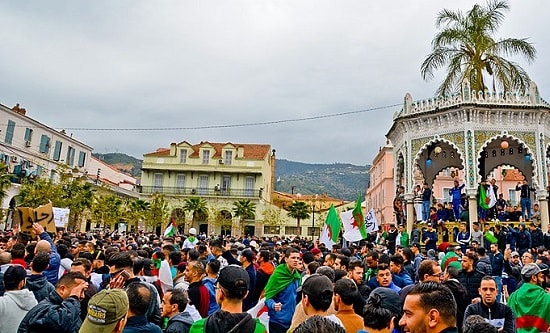
Protesters have continued to come out on the streets of the main Algerian cities since 16 February 2019. The mobilisations have involved hundreds of thousands, and strikes have managed to bring some cities, including the capital Algiers, to a standstill. The mass demonstrations started when 82-year-old Abdelaziz Bouteflika announced on 12 February that he would run for a fifth term as president. After seven weeks of protests, Bouteflika resigned on 2 April and the new president, Abdelkader Bensalah, promised ‘free and fair elections’ within 90 days. Despite these concessions, the protests haven’t ceased.
Bouteflika had been Algeria’s president for 20 years. His party the National Liberation Front (FLN) had been in power since independence from France in 1962. During Bouteflika’s presidency the Algerian bourgeoisie enriched itself through rents from natural resources, while the mass of the people saw little improvement to their lives (See FRFI 269). Bouteflika, who was due to run for re-election in April, called off the elections in the first stages of the protests. As the protests continued and the army dropped its support for the government, Bouteflika resigned to be replaced by Bensalah. Fresh elections are now due to take place by July but no exact date has been set.
Incumbent president Bensalah is from a different party, the Democratic National Rally (RND), but doesn’t represent any kind of progress. RND has always allied itself with the FLN; if anything it represents the right wing of the ruling class. Bensalah himself was already the head of the two houses of parliament with the FLN’s support: the People’s National Assembly and the Council of the Nation. Protests resumed after Bensalah’s appointment, demanding that he and the rest of Bouteflika’s ‘old guard’ resign.
Since Bouteflika’s resignation, Bensalah’s new government and the army have started a witch-hunt against political opponents, ranging from supporters of the former president to opposition figure Louisa Hanoune, from the Workers’ Party (PT). The aim is to give an image of fighting corruption while eliminating opposition, both in preparation for the upcoming elections. Abdelaziz Bouteflika’s younger brother Said, who was seen as a potential successor, was arrested on 2 April – the day of the president’s resignation – together with two intelligence chiefs. A dozen prominent businessmen close to Bouteflika’s government were also arrested soon after. These included Ali Haddad, the president of the employers’ federation (FCE) and close friend of the Bouteflika brothers, who was detained at the Tunisian border while trying to escape Algeria. The politicians and some of the businessmen are being accused of ‘undermining the authority of the army’ and ‘conspiracy against the authority of the state’. As the Bouteflikas’ close supporters are targeted, the arrests indicate an internal power struggle in the ruling class rather than genuine change.
Louisa Hanoune of the PT was arrested on 9 May. Although the PT, a Trotskyist organisation, has consistently opposed the FLN government, Hanoune’s arrest has been related to the charges against Said Bouteflika. The basis for the charges against Hanoune is a meeting between Said and herself shortly before Abdelaziz Bouteflika’s resignation. While Hanoune says that she attended and acted in her role as opposition leader, the army accuses her of collusion with the retired president’s allies. The PT has so far been a small electoral force, but it has gained strength through this year’s mass protests. Furthermore, the veracity of previous election results has been questioned by many as Bouteflika continuously won with landslide vote shares over 80%.
The head of the army has unofficially proposed for the presidential elections to take place on 4 July. As the date looms, it is unclear whether the vote will bring change or instead give legitimacy to the new military-backed Bensalah government. The only measure taken by the ruling class to appease the protesters has been to change faces, a step which has not reduced the numbers on the streets. The protesters, many of them students and young unemployed people, with a large number of women actively involved in the demonstrations, are motivated by a need for both political and economic change – Alegeria’s youth unemployment rate is almost 30%. Interviewed by the BBC, a mother of five unemployed children complained, ‘There’s nothing for the young generation. No jobs and no houses. They can’t get married. We want this whole system to go.’ While lack of democracy and accountability continue, together with issues such as chronic unemployment and deteriorating living standards, the protests are not predicted to stop.
Elias Haddad




